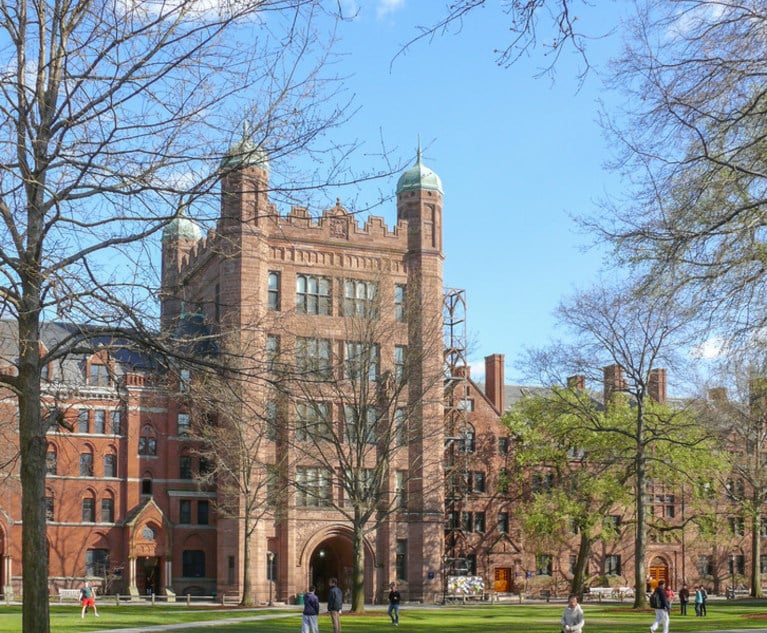Francis Dineen, Founder of New Haven Legal Aid Association, Dies at 84
The founder of the New Haven Legal Assistance Association Inc. was one of Connecticut's leading tenant advocates. He died Wednesday at 84.
September 26, 2019 at 05:39 PM
3 minute read
 Coffin with flowers. Photo: Robert Hoetink/Shutterstock.com
Coffin with flowers. Photo: Robert Hoetink/Shutterstock.com
Francis Dineen, one of the pioneers of representing tenants in eviction cases in Connecticut, died Wednesday in Hamden. He was 84 years old.
Dineen founded the New Haven Legal Aid Assistance Association in 1964,
Some of those who knew, worked with or watched Dineen as an attorney say there was no one who had more passion for his work, his clients, his friends and colleagues.
"He was someone who felt we were representing clients who did not always get treated the best in court. He made sure they were respected, and he advocated for them," said Shelley White, director of litigation for the association, where Dineen worked as senior counsel.
White, who knew Dineen since 1987 when she began working for the association, said he mentored and taught generations of attorneys over the 55 years he spent with the nonprofit, and as a law professor at Yale University Law School, where he taught two clinical programs: a landlord/tenant clinic and a legal aid bureau, where students would work at the association.
"This is such a loss to us and to the state of Connecticut," White said. "I don't know that there is anyone like Frank out there today."
Longtime New Haven attorney John Williams got to know Dineen in 1969, when he worked for the association for two years. Williams called Dineen the "guru in defending eviction cases."
Back in the day, Williams said, what Dineen was doing was not only unheard of, but also very unpopular among many segments of the New Haven community.
"When he started in the 1960s and 1970s doing this work, the idea of free legal assistance to the poor was considered socialism," Williams said Thursday. "There were a group of lawyers in the New Haven County Bar Association who tried hard to shut him and the operation down. In particular, the landlord/tenant bar was used to getting what they wanted without pushback. Frank totally changed that dynamic. Even though he had bitter enemies, I never heard him say a harsh word about anyone."
Williams said he considered Dineen, the son of a lawyer, "as a classic example of a secular priest."
"He devoted his life to taking care of the poor and underserved people in the city of New Haven without a moment's concern for money, prestige or anything except doing good," Williams said.
Later in his career, White said Dineen was known to a whole new generation of attorneys as a caring man who was accessible to everyone.
"He had an open-door policy," White said. "He always made time to talk to you and answer your questions. He always had a smile on his face and he enjoyed trying to puzzle out the answers to complicated legal questions."
This content has been archived. It is available through our partners, LexisNexis® and Bloomberg Law.
To view this content, please continue to their sites.
Not a Lexis Subscriber?
Subscribe Now
Not a Bloomberg Law Subscriber?
Subscribe Now
NOT FOR REPRINT
© 2025 ALM Global, LLC, All Rights Reserved. Request academic re-use from www.copyright.com. All other uses, submit a request to [email protected]. For more information visit Asset & Logo Licensing.
You Might Like
View All

Discovery Seeks to Link Yale University to Doctor in Fertility Scandal
4 minute read
SEC Puts Beat Down on Ex-Wrestling CEO Vince McMahon for Not Reporting Settlements
3 minute readTrending Stories
Who Got The Work
J. Brugh Lower of Gibbons has entered an appearance for industrial equipment supplier Devco Corporation in a pending trademark infringement lawsuit. The suit, accusing the defendant of selling knock-off Graco products, was filed Dec. 18 in New Jersey District Court by Rivkin Radler on behalf of Graco Inc. and Graco Minnesota. The case, assigned to U.S. District Judge Zahid N. Quraishi, is 3:24-cv-11294, Graco Inc. et al v. Devco Corporation.
Who Got The Work
Rebecca Maller-Stein and Kent A. Yalowitz of Arnold & Porter Kaye Scholer have entered their appearances for Hanaco Venture Capital and its executives, Lior Prosor and David Frankel, in a pending securities lawsuit. The action, filed on Dec. 24 in New York Southern District Court by Zell, Aron & Co. on behalf of Goldeneye Advisors, accuses the defendants of negligently and fraudulently managing the plaintiff's $1 million investment. The case, assigned to U.S. District Judge Vernon S. Broderick, is 1:24-cv-09918, Goldeneye Advisors, LLC v. Hanaco Venture Capital, Ltd. et al.
Who Got The Work
Attorneys from A&O Shearman has stepped in as defense counsel for Toronto-Dominion Bank and other defendants in a pending securities class action. The suit, filed Dec. 11 in New York Southern District Court by Bleichmar Fonti & Auld, accuses the defendants of concealing the bank's 'pervasive' deficiencies in regards to its compliance with the Bank Secrecy Act and the quality of its anti-money laundering controls. The case, assigned to U.S. District Judge Arun Subramanian, is 1:24-cv-09445, Gonzalez v. The Toronto-Dominion Bank et al.
Who Got The Work
Crown Castle International, a Pennsylvania company providing shared communications infrastructure, has turned to Luke D. Wolf of Gordon Rees Scully Mansukhani to fend off a pending breach-of-contract lawsuit. The court action, filed Nov. 25 in Michigan Eastern District Court by Hooper Hathaway PC on behalf of The Town Residences LLC, accuses Crown Castle of failing to transfer approximately $30,000 in utility payments from T-Mobile in breach of a roof-top lease and assignment agreement. The case, assigned to U.S. District Judge Susan K. Declercq, is 2:24-cv-13131, The Town Residences LLC v. T-Mobile US, Inc. et al.
Who Got The Work
Wilfred P. Coronato and Daniel M. Schwartz of McCarter & English have stepped in as defense counsel to Electrolux Home Products Inc. in a pending product liability lawsuit. The court action, filed Nov. 26 in New York Eastern District Court by Poulos Lopiccolo PC and Nagel Rice LLP on behalf of David Stern, alleges that the defendant's refrigerators’ drawers and shelving repeatedly break and fall apart within months after purchase. The case, assigned to U.S. District Judge Joan M. Azrack, is 2:24-cv-08204, Stern v. Electrolux Home Products, Inc.
Featured Firms
Law Offices of Gary Martin Hays & Associates, P.C.
(470) 294-1674
Law Offices of Mark E. Salomone
(857) 444-6468
Smith & Hassler
(713) 739-1250











